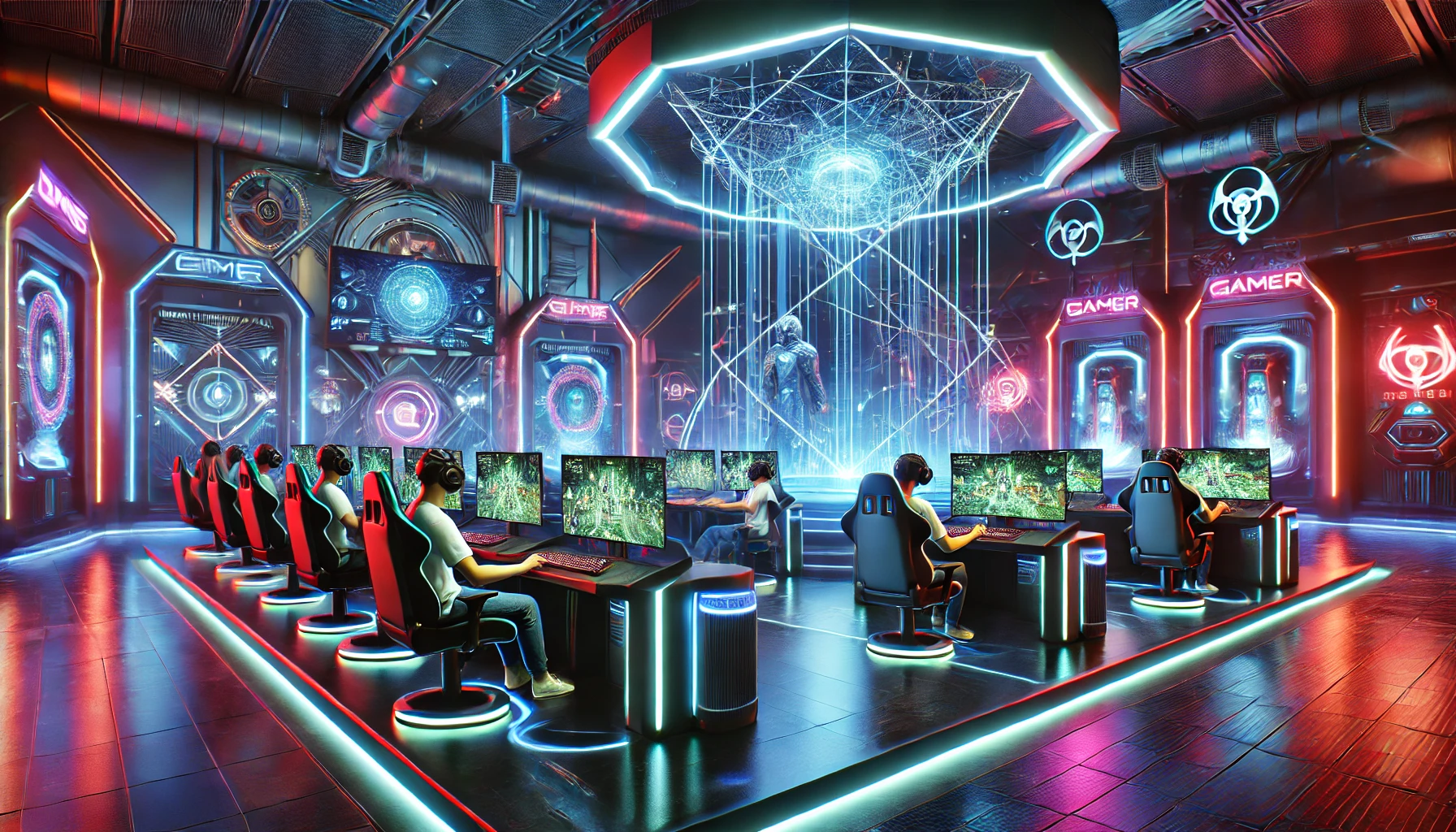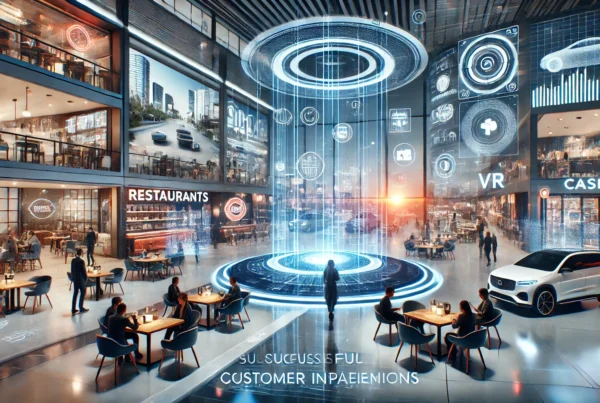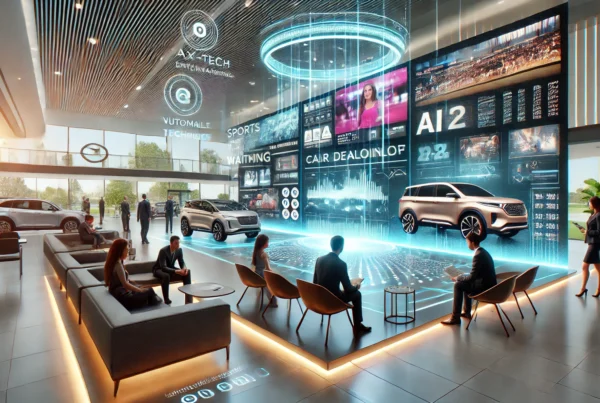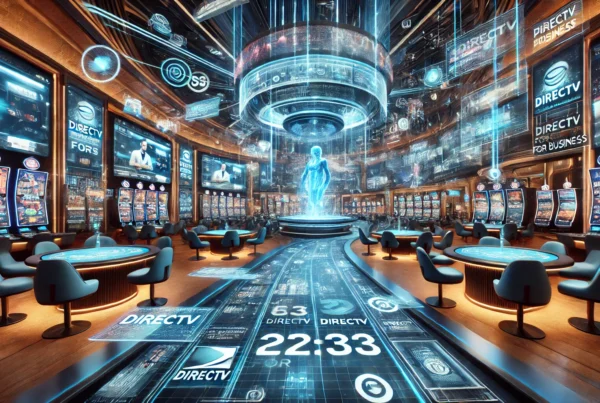In today’s fiercely competitive gaming industry, standing out requires more than just high-quality games. It’s about creating an immersive experience that keeps players coming back for more. This is where entertainment as a competitive advantage comes into play, offering gaming businesses a unique edge.
The concept of leveraging entertainment to gain a competitive advantage isn’t new, but its application in the gaming industry is gaining momentum. From captivating in-game events to engaging community activities, successful gaming companies are those that understand the power of entertainment in attracting and retaining customers. In an industry where innovation and player engagement are paramount, offering exceptional entertainment experiences can be the key differentiator.
For business owners and decision-makers in the hospitality, gaming, auto, and private office sectors, understanding how to harness entertainment effectively can transform their establishments. By integrating the latest trends and strategies, such as interactive events, exclusive content, and community-driven experiences, businesses can create a compelling environment that not only draws in new customers but also fosters loyalty among existing ones.
In this blog post, we will explore how offering exceptional entertainment experiences can provide a competitive edge in the gaming industry. We’ll delve into the latest trends, share success stories, and offer actionable strategies to help you leverage entertainment to attract and retain customers. Stay tuned as we uncover the secrets to making entertainment your ultimate competitive advantage.
The Role of Entertainment in Enhancing Customer Experience
In the competitive landscape of the gaming industry, providing exceptional entertainment experiences can significantly enhance customer satisfaction and loyalty. As gaming establishments strive to differentiate themselves, the integration of engaging and immersive entertainment options becomes a crucial strategy.
Entertainment as a competitive advantage is not just about flashy visuals or high-tech gadgets; it’s about creating memorable experiences that resonate with customers. According to a report by EY, 83% of gaming executives believe that continuous innovation and product differentiation are key to success in the industry. This highlights the importance of entertainment in fostering customer engagement and satisfaction.
Creating Immersive In-Game Experiences
One of the most effective ways to enhance customer experience is by creating immersive in-game experiences. This can include interactive storylines, dynamic environments, and personalized content that keeps players engaged. For instance, popular games like ‘League of Legends’ and ‘Fortnite’ regularly introduce new events and updates to keep the gameplay fresh and exciting.
Moreover, incorporating elements such as virtual reality (VR) and augmented reality (AR) can elevate the gaming experience to new heights. These technologies allow players to immerse themselves fully in the game world, creating a more engaging and memorable experience.
Engaging Community Activities
Beyond the game itself, fostering a sense of community among players can significantly enhance customer experience. Hosting community events, tournaments, and interactive sessions can help build a loyal customer base. According to a study by ECG Productions, the eSports industry has seen a surge in popularity due to its ability to bring people together through competitive gaming events.
Engaging community activities not only provide entertainment but also create opportunities for players to connect with each other, share experiences, and build lasting relationships. This sense of belonging can lead to increased customer loyalty and repeat business.
Utilizing Data to Personalize Experiences
In today’s digital age, data plays a crucial role in understanding customer preferences and tailoring experiences to meet their needs. By leveraging data analytics, gaming establishments can gain insights into player behavior, preferences, and trends. This information can be used to personalize in-game content, offer targeted promotions, and enhance overall customer satisfaction.
For example, casinos can use data to identify high-value customers and offer them exclusive rewards and experiences. This personalized approach not only enhances customer satisfaction but also encourages repeat visits and long-term loyalty.
In conclusion, entertainment as a competitive advantage in the gaming industry is about more than just providing fun and excitement. It’s about creating immersive, engaging, and personalized experiences that resonate with customers and foster loyalty. By leveraging innovative technologies, engaging community activities, and data-driven personalization, gaming establishments can significantly enhance customer experience and gain a competitive edge.
Innovative Trends in Gaming Entertainment
The gaming industry is constantly evolving, and staying ahead of the curve requires an understanding of the latest trends. Leveraging entertainment as a competitive advantage can significantly enhance a gaming company’s position in the market. Here, we explore the most innovative trends shaping the future of gaming entertainment.
Virtual Reality (VR) and Augmented Reality (AR)
Virtual Reality (VR) and Augmented Reality (AR) are transforming the gaming landscape by offering immersive experiences that were previously unimaginable. According to a report by EY, 83% of gaming executives believe that continuous innovation, including VR and AR, is crucial for success. Games like ‘Beat Saber’ and ‘Pokémon GO’ have demonstrated the potential of these technologies to engage players deeply.
VR provides a fully immersive environment, allowing players to step into the game world and interact with it in a lifelike manner. AR, on the other hand, overlays digital elements onto the real world, creating a blended experience. These technologies not only enhance gameplay but also open new avenues for storytelling and player interaction.
Cloud Gaming
Cloud gaming is another trend revolutionizing the industry. It allows players to stream games directly from the cloud, eliminating the need for high-end hardware. This accessibility is expanding the gaming audience and making it easier for people to play high-quality games on any device. Services like Google Stadia and NVIDIA GeForce Now are leading the charge in this space.
Cloud gaming offers several benefits, including reduced latency, instant game access, and the ability to play on multiple devices. As internet infrastructure improves globally, cloud gaming is expected to become more prevalent, providing a seamless and convenient gaming experience.
Esports and Competitive Gaming
The rise of esports has been meteoric, with competitive gaming becoming a major entertainment sector. According to ECG Productions, the esports industry has seen unprecedented growth, particularly in the U.S., transforming competitive gaming into a widely recognized sport. Major tournaments like ‘The International’ and ‘League of Legends World Championship’ attract millions of viewers and offer substantial prize pools.
Esports provides a platform for professional gamers to showcase their skills and for fans to engage with their favorite players and teams. The industry is also attracting significant investments from brands and media companies, further solidifying its position in the entertainment landscape.
Artificial Intelligence (AI) and Machine Learning
Artificial Intelligence (AI) and Machine Learning are playing a crucial role in enhancing gaming experiences. AI is used to create smarter and more challenging non-player characters (NPCs), while machine learning algorithms can personalize gaming experiences based on player behavior. This technology is making games more adaptive and engaging.
For example, AI-driven analytics can help developers understand player preferences and tailor content to meet their needs. Additionally, AI can be used to detect and prevent cheating, ensuring fair play in competitive gaming environments.
Blockchain and NFTs
Blockchain technology and Non-Fungible Tokens (NFTs) are emerging trends that are starting to make an impact on the gaming industry. Blockchain can provide secure and transparent transactions, which is particularly useful for in-game purchases and virtual economies. NFTs offer a way to own unique digital assets, such as rare in-game items or collectibles.
Games like ‘Axie Infinity’ and ‘CryptoKitties’ have popularized the use of blockchain and NFTs, allowing players to buy, sell, and trade digital assets. This trend is creating new opportunities for monetization and player engagement.
In conclusion, staying abreast of these innovative trends is essential for gaming companies looking to leverage entertainment as a competitive advantage. By embracing technologies like VR, cloud gaming, esports, AI, and blockchain, businesses can create compelling experiences that attract and retain players, giving them a significant edge in the competitive gaming industry.
Case Studies of Successful Entertainment Implementations
In the competitive gaming industry, leveraging entertainment as a competitive advantage can significantly enhance customer engagement and loyalty. This section delves into case studies of successful entertainment implementations in gaming establishments, highlighting specific tactics and their outcomes.
Fortnite: Interactive In-Game Events
Epic Games’ Fortnite has set a benchmark in the gaming industry with its innovative approach to in-game events. By hosting live, interactive events within the game, Fortnite has managed to create a dynamic and engaging environment for players. For instance, the in-game concert by Travis Scott attracted over 12 million concurrent players, showcasing the potential of integrating entertainment into the gaming experience.
These events not only provide a unique experience for players but also create a buzz that extends beyond the game itself. The success of these events is evident in the increased player engagement and the extensive media coverage they receive. By continuously introducing new and exciting content, Fortnite has maintained its position as a leader in the gaming industry.
League of Legends: Esports and Community Engagement
Riot Games’ League of Legends has successfully leveraged esports and community engagement to build a loyal player base. The game’s annual World Championship is one of the most-watched esports events globally, attracting millions of viewers. This high level of engagement is achieved through strategic partnerships, extensive marketing, and a strong focus on community-building activities.
Riot Games has also invested in local leagues and tournaments, fostering a sense of community among players. By providing platforms for amateur players to compete and showcase their skills, League of Legends has created a thriving ecosystem that supports both professional and casual gamers. This approach has not only enhanced player retention but also positioned the game as a cornerstone of the esports industry.
Axie Infinity: Blockchain and NFTs
Axie Infinity has revolutionized the gaming industry by incorporating blockchain technology and Non-Fungible Tokens (NFTs). This play-to-earn model allows players to earn real-world value through in-game activities, creating a unique and engaging experience. Players can buy, sell, and trade digital assets, such as rare in-game items, on the blockchain, providing them with a sense of ownership and investment in the game.
The success of Axie Infinity is evident in its rapidly growing player base and the substantial revenue generated from in-game transactions. By integrating blockchain technology, the game has tapped into a new market of players interested in both gaming and cryptocurrency. This innovative approach has set a new standard for how entertainment can be used as a competitive advantage in the gaming industry.
These case studies illustrate the diverse ways in which gaming companies can leverage entertainment to gain a competitive edge. By creating immersive experiences, engaging communities, and integrating cutting-edge technologies, these companies have successfully enhanced player engagement and loyalty. For gaming establishments looking to stay ahead in the industry, these examples provide valuable insights and actionable strategies.
Maximizing Competitive Advantage through Entertainment
As we’ve explored throughout this blog post, entertainment plays a pivotal role in giving gaming establishments a significant edge. By creating immersive, engaging, and personalized experiences, businesses can not only attract new customers but also foster loyalty among existing ones. The integration of innovative technologies like VR, AR, and AI, coupled with community-driven activities and data-driven personalization, sets the stage for a compelling competitive advantage.
Consider the success stories of industry leaders like Fortnite with its interactive in-game events, League of Legends through its robust esports ecosystem, and Axie Infinity leveraging blockchain and NFTs. These examples illustrate how varied approaches to entertainment can yield substantial benefits, from increased player engagement to significant revenue growth.
To help you harness the power of entertainment, here are some key takeaways:
- **Embrace Innovative Technologies**: Utilize VR, AR, and AI to create immersive and adaptive gaming experiences.
- **Foster Community Engagement**: Host events, tournaments, and interactive sessions to build a loyal customer base.
- **Leverage Data Analytics**: Personalize experiences and promotions based on customer behavior and preferences.
- **Stay Ahead of Trends**: Keep up with the latest industry trends to continuously innovate and differentiate your offerings.
As the gaming industry continues to evolve, staying ahead means continuously innovating and adapting to new trends. By leveraging entertainment as a competitive advantage, gaming establishments can create memorable experiences that resonate with players and keep them coming back for more.
Ready to gain an edge in the gaming industry? Explore more insights and strategies on our website at Sports Direct. Let’s transform your gaming business into a powerhouse of entertainment and engagement.








